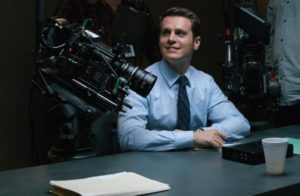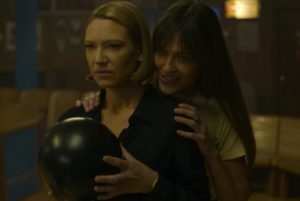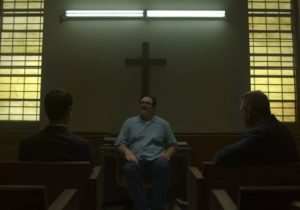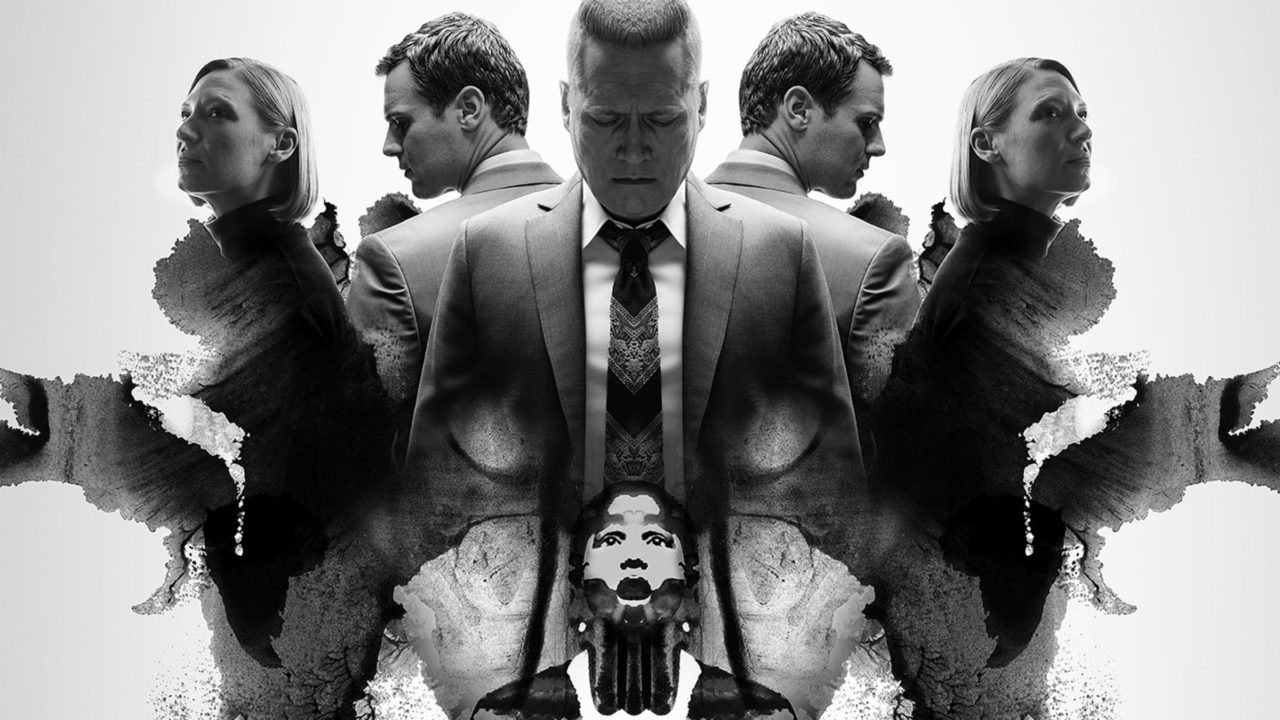After close to a two-year wait, the second season of Mindhunter arrived on Netflix in late August and those 9 episodes confirmed that the psychological thriller is currently Netflix’s best original series. The streaming service, while continuing to be almost a necessity in the current television era, has seemingly chosen the ‘quantity over quality’ route in terms of its original programming, but Mindhunter is a bright spot in the ever-growing catalogue. While I thought the second season was weaker than the first – for reasons I’ll be sure to mention in the coming paragraphs – it was still brilliant television and an evolution of the series. The first season charted FBI agents Holden Ford and Bill Tench’s journey into the minds of madness as they interviewed serial killers in the hope of understanding the twisted reasoning behind their heinous crimes, while dealing with the fallout of the old mantra, “if you stare into the abyss, the abyss stares back into you”. The second season continued this but moved the show forward, both in time and premise, with the agents now having to put what they’ve learnt into practice in order to catch the perpetrator of the Atlanta child murders. But, after tackling such a high-profile case, what’s next for Netflix’s best series?
 Well, first of all, my main hope for Mindhunter season 3 is that there is a season 3. As of writing the series has yet to be renewed, or at least renewal hasn’t been publicly confirmed. I imagine that it won’t be long until we hear about the future of the show and it’ll be a great shame to lose it. Netflix are often cagey with viewing figures (unless it’s Bird Box for some reason) but I hope that there are plenty of people with good taste out there and that the audience has remained strong, despite the long wait between seasons. One of the reasons behind the 22-month break is that David Fincher, director and a major creative force behind the show, wasn’t prepared to begin shooting the season until he was happy with all 9 scripts. One of the reasons I think Mindhunter will be around for the long haul is that I don’t think Netflix would do anything to jeopardise their relationship with Fincher, one of the best directors working today, who has chosen Netflix as the home of his next movie. A movie that could mean a greater delay between the second and third seasons of Mindhunter. But I’ll wait for when Fincher’s ready. In fact, I’d love him to direct every episode. I know that’s never going to happen but I feel his episodes are noticeably better directed. The entire series is well directed but his instalments stand out, so much so that I wasn’t aware he directed the third episode of the latest season before I watched it (I believed he directed the first two and last two like he did with season 1) but could tell it was a Fincher episode just a couple of minutes in.
Well, first of all, my main hope for Mindhunter season 3 is that there is a season 3. As of writing the series has yet to be renewed, or at least renewal hasn’t been publicly confirmed. I imagine that it won’t be long until we hear about the future of the show and it’ll be a great shame to lose it. Netflix are often cagey with viewing figures (unless it’s Bird Box for some reason) but I hope that there are plenty of people with good taste out there and that the audience has remained strong, despite the long wait between seasons. One of the reasons behind the 22-month break is that David Fincher, director and a major creative force behind the show, wasn’t prepared to begin shooting the season until he was happy with all 9 scripts. One of the reasons I think Mindhunter will be around for the long haul is that I don’t think Netflix would do anything to jeopardise their relationship with Fincher, one of the best directors working today, who has chosen Netflix as the home of his next movie. A movie that could mean a greater delay between the second and third seasons of Mindhunter. But I’ll wait for when Fincher’s ready. In fact, I’d love him to direct every episode. I know that’s never going to happen but I feel his episodes are noticeably better directed. The entire series is well directed but his instalments stand out, so much so that I wasn’t aware he directed the third episode of the latest season before I watched it (I believed he directed the first two and last two like he did with season 1) but could tell it was a Fincher episode just a couple of minutes in.
 So far, I’ve only mentioned Holden Ford and Bill Tench as the show’s leads but, while it’s sometimes hard to tell from watching an episode, Anna Torv portrays the series’ third lead character Dr Wendy Carr. One of my hopes for the third season is that the writers actually give her something to do. I thought her story in the second season started out well, with Wendy first being tasked to keep an eye on the brilliant but often frustratingly unequivocal Holden until he leaves for Atlanta and she can step into the limelight and perform the interviews vital to their work herself. She has a strong middle of the season and her interview scenes are great, often revealing more about her than the subject, as she at first succeeds (by revealing that she’s gay only for her colleagues to assume she was lying) and then fails, but once the season shifts almost all of its focus on the Atlanta murders Wendy’s story fizzles out. She has a romance subplot that weaves throughout the nine episodes, and while it builds her character and confronts her cold persona, it feels rather generic and unfulfilling, and she has only a single dialogue-less scene in the finale. I hope the third season will give her a bigger role or if not, her storyline can be a comment on how little she gets to do compared to the male characters and bring forth some of the problems with the show into the narrative itself.
So far, I’ve only mentioned Holden Ford and Bill Tench as the show’s leads but, while it’s sometimes hard to tell from watching an episode, Anna Torv portrays the series’ third lead character Dr Wendy Carr. One of my hopes for the third season is that the writers actually give her something to do. I thought her story in the second season started out well, with Wendy first being tasked to keep an eye on the brilliant but often frustratingly unequivocal Holden until he leaves for Atlanta and she can step into the limelight and perform the interviews vital to their work herself. She has a strong middle of the season and her interview scenes are great, often revealing more about her than the subject, as she at first succeeds (by revealing that she’s gay only for her colleagues to assume she was lying) and then fails, but once the season shifts almost all of its focus on the Atlanta murders Wendy’s story fizzles out. She has a romance subplot that weaves throughout the nine episodes, and while it builds her character and confronts her cold persona, it feels rather generic and unfulfilling, and she has only a single dialogue-less scene in the finale. I hope the third season will give her a bigger role or if not, her storyline can be a comment on how little she gets to do compared to the male characters and bring forth some of the problems with the show into the narrative itself.
 However, the standout character from the first season wasn’t any of the leads but rather the supporting character of Ed Kemper, brilliantly played by Cameron Britton. Kemper was a key part of the first season but was relegated to only one scene in the second. It’s a choice I can understand but I think it’s the wrong one to make. The writers wanted to make way for new interview subjects like the much-hyped appearance of Holden’s dream interviewee Charles Manson, and then later in the season focus on the case in Atlanta. Plus, there’s the fact that Kemper probably doesn’t have any more insight to offer the Behavioural Science Unit. But that was never the full purpose of his character. It was his role in Holden’s season 1 arc that was important, about how he lulled Holden into a certain state of mind of forgetting how dangerous these killers were before suddenly reminding him of the fact in the final scene of the season, partly resulting in Holden’s anxiety attacks. Holden may want to move on and forget about that in season 2 (although I don’t like how fast the series forgets about Holden’s anxiety attacks) but Kemper wouldn’t. He saw Holden as a friend, sent him letters and ultimately slit his wrists so Holden would go and see him but this is completely dropped in season 2. In his sole scene in episode 5, Kemper doesn’t even mention what happened in the hospital or how he feels about Holden. So, in season 3, I hope Kemper returns to a more prominent position, not necessarily in the work done by the BSU but rather in a more personal relationship with Holden.
However, the standout character from the first season wasn’t any of the leads but rather the supporting character of Ed Kemper, brilliantly played by Cameron Britton. Kemper was a key part of the first season but was relegated to only one scene in the second. It’s a choice I can understand but I think it’s the wrong one to make. The writers wanted to make way for new interview subjects like the much-hyped appearance of Holden’s dream interviewee Charles Manson, and then later in the season focus on the case in Atlanta. Plus, there’s the fact that Kemper probably doesn’t have any more insight to offer the Behavioural Science Unit. But that was never the full purpose of his character. It was his role in Holden’s season 1 arc that was important, about how he lulled Holden into a certain state of mind of forgetting how dangerous these killers were before suddenly reminding him of the fact in the final scene of the season, partly resulting in Holden’s anxiety attacks. Holden may want to move on and forget about that in season 2 (although I don’t like how fast the series forgets about Holden’s anxiety attacks) but Kemper wouldn’t. He saw Holden as a friend, sent him letters and ultimately slit his wrists so Holden would go and see him but this is completely dropped in season 2. In his sole scene in episode 5, Kemper doesn’t even mention what happened in the hospital or how he feels about Holden. So, in season 3, I hope Kemper returns to a more prominent position, not necessarily in the work done by the BSU but rather in a more personal relationship with Holden.
 But the lack of Kemper highlights another possible misstep the series is taking; one I hope will be corrected in season 3. Overall I enjoyed the Atlanta case that dominated the second half of the season and it’s right at this stage in the series to make the BSU have to put all their theories into practice and apply the knowledge they’ve gained, but this is an evolution I could see being pushed too far. The truth is that the series does the interviews and the exploration of the psychology of killers better than the more standard procedural elements and now that the Atlanta case has opened the door to more of the latter, I hope we don’t lose the former. I fear the focus of the series could be altered too much and I hope the interviews remain a core part of the show. Manson may have been the swansong for that part of the series and to keep it intact I feel a time jump might be required. I don’t know what the long-term plan for the series is or how long it will run but a time jump of a few years at this stage would offer more subjects to interview, as well as chart the evolution of the BSU. Just a couple of years and Richard Hansen could appear, a few more and we arrive at Ted Bundy’s confession in 1989 and a couple more (likely in a future season) and Jeffrey Dahmer could be featured. Plus, we don’t know what the plan is for Dennis Rader/The BTK Killer. We get a vignette featuring him in most episodes and he’s now on the BSU’s radar but what’s the endgame there? Continue with the short scenes that highlight his evasion of not just the police but also the criteria of their profiles, or an eventual flashforward to his arrest, which doesn’t happen until 2005?
But the lack of Kemper highlights another possible misstep the series is taking; one I hope will be corrected in season 3. Overall I enjoyed the Atlanta case that dominated the second half of the season and it’s right at this stage in the series to make the BSU have to put all their theories into practice and apply the knowledge they’ve gained, but this is an evolution I could see being pushed too far. The truth is that the series does the interviews and the exploration of the psychology of killers better than the more standard procedural elements and now that the Atlanta case has opened the door to more of the latter, I hope we don’t lose the former. I fear the focus of the series could be altered too much and I hope the interviews remain a core part of the show. Manson may have been the swansong for that part of the series and to keep it intact I feel a time jump might be required. I don’t know what the long-term plan for the series is or how long it will run but a time jump of a few years at this stage would offer more subjects to interview, as well as chart the evolution of the BSU. Just a couple of years and Richard Hansen could appear, a few more and we arrive at Ted Bundy’s confession in 1989 and a couple more (likely in a future season) and Jeffrey Dahmer could be featured. Plus, we don’t know what the plan is for Dennis Rader/The BTK Killer. We get a vignette featuring him in most episodes and he’s now on the BSU’s radar but what’s the endgame there? Continue with the short scenes that highlight his evasion of not just the police but also the criteria of their profiles, or an eventual flashforward to his arrest, which doesn’t happen until 2005?
Mindhunter’s future is uncertain, both in terms of how the series will evolve as the BSU grows and takes on more active cases and in that it has yet to be renewed. But whatever the future holds and whether my hopes are fulfilled or squandered, I’ll be excited to watch more of this terrific series that holds a special place in the current overcrowded television landscape. What are your hopes for season 3 and do you agree or disagree with mine? Let me know in the comments and be sure to geek out with me about TV, movies and video-games on Twitter @kylebrrtt.








